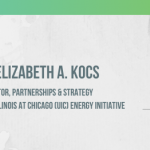Decarb Connect is a start-up company focused on supporting decarbonization of hard-to-abate sectors. In early 2021 it will be the platform for a Digital Festival to bring together reps from hard-to-abate sectors.
How did you discover Women in Cleantech & Sustainability?
I would say that I came across WCS as a happy accident. I’m based in the UK and found the WCS through online content and wondered about opportunities for partnering. I reached out through LinkedIn and talked with Kelly on the membership team and from there just felt it was a high-quality group that would be interesting to join.
And what would you like our members to know about you?
I’ve been in the events sector really for the majority of my career. In the last decade, my focus has been on energy and energy-related commodities. Conference production requires a lot of primary research, network building, and getting under the surface of an industry’s issues. You get to develop a deep level of knowledge about a particular topic, and it makes you very aware of how research and information is used to effect change.
You have founded an organization called Decarb Connect. Give us the elevator pitch for Decarb Connect and your decision to launch it.?
We are 100% focused on the “hard to abate” industrial sectors. And our mission is to help them accelerate decarbonization.
We bring together industrials, investors, policymakers and technologists to help them share evidence along with evidence-based strategies that can point these (sometimes) slow-moving industries in the right direction. Most importantly, the objective is to help them gain the relationships and information that help them achieve net-zero deadlines. For hard to abate sectors it’s a complex challenge – so we start by facilitating connections with other industries doing the same thing. There’s a lot of value in that shared experience. And we also help share information and case studies on the technologies that are proving to be scalable and investors who are proving capable of investing at scale.
It’s intriguing that you’re bringing industry sectors together that presumably have little to do with each other, like glass, oil & gas and cement. How did this form as an idea?
There are two different things that came together. One that’s personal. I’ve loved the event work that I’ve done. But I have found a growing sense that I genuinely need to contribute something that has a purpose-driven outcome.
Decarbonization has been gradually gaining more and more column inches in papers and on websites. So, at the start of this year when I was launching Decarb Connect, I started by simply doing an awful lot of interviews – more than 80 interviews with people in the industry, technology, policy, etc. Very quickly, I started understanding that it’s the “hard to abate” sectors that are so underserved with information and networks that they need and the specific evidence that can point towards the scalable technologies.
It was quickly apparent from talking to the corporates, and also advisers in the space and tech companies, that industrials were the groups that needed more access to information and evidence of what was possible. They were the companies that needed to do the most in the space because they are the ones emitting so such massive proportions of global CO2. They also had the biggest challenge in moving forward to achieve it. They have complex challenges having to do with the CapEx cycles they’re operating in, the typical margins – but also are foundational of the way we live and work.
In 2021, you’ve got an online event planned called Digital Festival.
Yes. The event is spread over three days. It’s international in reach. The set-up is about four hours of content each day and is split between how to research and establish the right strategy vs deployment and lessons learned from each pilot of specific technologies. We have over 50 speakers from around the world, including policymakers from the US, UK and Europe as well as industrials and disruptor tech too.
I’m impressed by the caliber of speakers.
Thank you, we’ve worked really hard on getting a good combination of some C-Suite executives. Just as important, we’ve also lined up the heads of innovation, strategy, and technology – the people who are involved in deploying the resources in line with the strategy and actual programs.
Will you see any numbers on the table? Will you be asking CEOs to pledge a particular reduction goal?
It might be something that we look at in the future. Our focus right now is on the work that corporations are doing and the results they are seeing. The goal of this is to facilitate cross-sector collaboration and action.
How can WCS participate in the Decarb Connect Digital Festival?
WCS members can access a free spectator pass to watch the recorded content. There’s also a discount code for people who would like to get involved or need the networking at a higher level. Also please listen to the podcasts and send me any ideas.
From listening to the podcasts on Decarb Connect’s website, you provide info on industry-specific innovations. For example – there are technologies on the horizon to help cement manufacturing reduce their 8% of all CO2 emissions.
Cement is the most used material on earth, and the nature of how it is produced leads to the highest emissions. Overall, the hard to abate sectors produce more than 20% of our global emissions – but again, it’s a complex market, and these companies are also foundational to our economies and way of life.
In your podcast with Rob West from Thunder Said Energy he is very data-driven. Alternatively, there’s a big decarbonization push that is mission-driven, led by world figureheads such as Greta Thunberg who sees the issue as a moral mandate and if there’s a will there is a way. It seems like you are helping industries come up with the way.
Our job as a team and as a business is to help them move forward with increasing speed. Acceleration comes from improved decisions based on shared information; it comes from helping people collaborate and find project partners. Better decisions, clearer plans linking strategy to deployment plus more confidence in the route forward – all of this contributes to accelerated results. Beyond this, we also hope to connect them with the financiers who can make at-scale decarbonization a reality.
To wrap up, what kind of advice would you give to those who feel a passionate impatience to see an economy with a lower carbon footprint?
I understand the impatience. I’m also keen to ensure that those with the ability to effect change do so. I would say let’s find ways for the people who are really powerful advocates for climate to get into discussions with people who want to effect changes from within these massive industries. That is a productive route to change.
Interviewed by Jeanne Trombly an Oakland, California-based Writer in Residence for Women in Cleantech and Sustainability.



